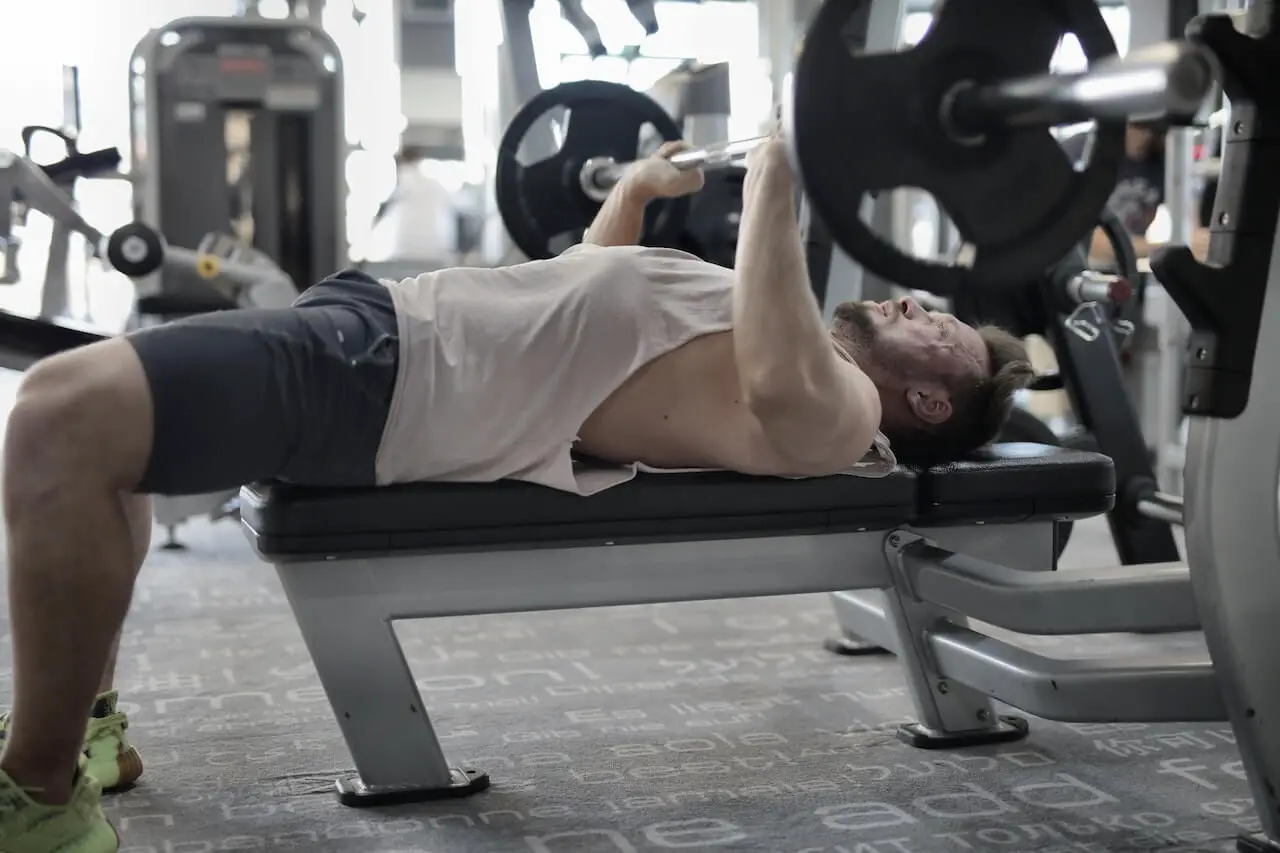Strength training can help improve overall strength, power, and endurance, which can enhance a swimmer’s performance. However, the extent to which strength training, including exercises like the bench press, directly transfers over to swimming performance is a nuanced topic.

The bench press will not directly help you swim faster, but when done as part of a comprehensive strength program, can make you faster indirectly. Bench press and push ups are often included in swimmers’ dryland routines to promote contralateral muscle balance in the back and shoulders. This helps keep a swimmer’s push and pull muscles balanced and prevent injury.
In this article, we will discuss whether it is beneficial for a swimmer to incorporate the bench press into their dryland routine, as well as any downsides they need to keep in mind.
Benefits of Strength Training for Swimmers
So why do swimmers even need to do any strength training in the first place? Here are a few of the top reasons:
- Increased Power: Strength training can increase the power of a swimmer’s kick and stroke. This is particularly beneficial for swimming styles that require explosive power, such as the butterfly or sprint freestyle.
- Injury Prevention: Strengthening the muscles around the shoulders, for example, can help prevent common swimming injuries.
- Improved Endurance: Strength training with higher repetitions can also improve muscular endurance, which can be beneficial for long-distance swimming.
- Body Control and Balance: Strength training can improve a swimmer’s body control and balance in the water, which can result in a more efficient stroke.
The Bench Press and Swimming
How does the bench press affect swimmers specifically?
The bench press is a strength exercise that primarily targets the pectoral muscles, along with the triceps and deltoids.
These muscles are used in the pulling phase of a swim stroke. Despite the same muscles being used, the movement patterns of a bench press and a swimming stroke are quite different.
In fact, the movements involved in most gym-based strength training exercises don’t mimic the exact movements used in a specific sport, let alone swimming.
For instance, the bench press involves a pushing motion in a relatively fixed plane of movement. However, in swimming, the movement of the arms is more complex, involving not only pushing but also pulling and rotating, in a variety of planes of movement. The muscles are working together in a different way and in a different sequence compared to a bench press.
This means that the strength gains from bench pressing might not translate directly to improved swimming performance. This is why many strength and conditioning programs for athletes also include sport-specific exercises that more closely mimic the movements of the sport.
Therefore, while the bench press might help to build strength in the muscles used for swimming, it may not directly improve the specific movements used in swimming.
Potential Downsides of the Bench Press for Swimming
So now that we know what some of the benefits for the bench press are, what are some of the negatives you should be concerned with?
- Non-Specific Movement Patterns: As mentioned, the movement patterns in strength exercises like the bench press do not directly mimic the movements in swimming. Therefore, the strength gains may not fully transfer over to swimming performance.
- Risk of Bulking Up: Excessive strength training could lead to an increase in muscle mass, which could potentially increase a swimmer’s drag in the water. However, this is generally not a concern unless the training is specifically geared towards bodybuilding or powerlifting.
- Potential for Overtraining: Balancing swimming training with strength training requires careful planning to avoid overtraining. Too much training can lead to fatigue, decreased performance, and increased risk of injury.
- Risk of Injury: If you overdo your workouts or perform the exercises with bad technique, there is a risk of injury. Despite appearances, the bench press is actually a highly technical movement and you can easily injure your shoulders if you perform it incorrectly.
Barbell Bench Press vs. Dumbbell Bench Press
There are subtle differences between the barbell bench press and the dumbbell bench press that might impact a swimmer’s performance.
- Stabilization: Dumbbell bench presses require more stabilization because you’re lifting two independent weights. This can help to improve your stabilizer muscles, which can be beneficial for swimming since swimming also requires a significant amount of stabilization.
- Range of Motion: Dumbbell bench presses generally allow for a greater range of motion than barbell bench presses. This can lead to greater activation of the pectoral muscles, which could potentially improve the power of your swimming stroke.
- Muscle Imbalances: Dumbbell bench presses can help to correct muscle imbalances since each arm is lifting its own weight. This can be beneficial for swimmers since a symmetrical stroke is often more efficient.
However, both exercises target similar muscle groups and can contribute to overall strength gains that can be beneficial for swimming.
The Verdict
Should swimmers bench press? Sure, but don’t overdo it! While there may not be a strong correlation between a strong bench press and swimming speed, bench pressing is one of the best ways to train your pectoral muscles.
By bench pressing, you can promote contralateral muscle balance in the back and shoulders. A swimmer who can pull much harder than he can push will struggle to make progress on pulls until their pushing muscles have caught up to some extent.
Typically cases are not that extreme, but both the pushing and pulling muscles should be somewhat comparable in strength for optimal swimming performance. Having a balanced physique also helps with injury prevention.
For these reasons alone, swimmers should definitely include the bench press into their dryland training routine. Just keep in mind that excelling at the bench press does not necessarily make you a faster swimmer, and that you should still prioritize your swim training if you want to swim faster.
Sources:

